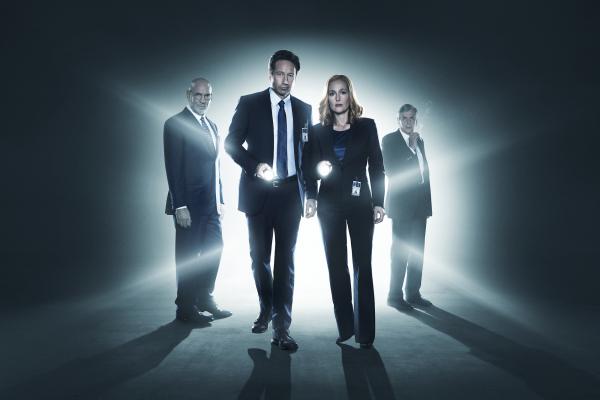Happy Star Wars week! This piece is part of a series on God in sci-fi and fantasy. Read the other entries here.
In the closing scene of what we thought(!!!!) was the final episode of The X-Files 13 years ago, leads Fox Mulder (David Duchovny) and Dana Scully (Gillian Anderson) summarize the past nine years spent chasing monsters and the truth in a beautiful exchange with which those who have spent their lives on a faith journey will quickly identify.
SCULLY: You've always said that you want to believe. But believe in what Mulder? If this is the truth that you've been looking for then what is left to believe in?
MULDER: I want to believe that the dead are not lost to us. That they speak to us as part of something greater than us — greater than any alien force. And if you and I are powerless now, I want to believe that if we listen to what's speaking, it can give us the power to save ourselves.
SCULLY: Then we believe the same thing.
[Zoom in on the cross necklace that Scully has worn since her preteen years when her mother gifted matching sets to her and her now-deceased sister; the same necklace that Mulder treasured when Scully was missing and presumed dead; the same necklace Scully gave her biological daughter (the result of a bizarre science experiment perpetrated by either the government or aliens, it was always unclear) and was left behind in the casket when that daughter died and her body confiscated.]
MULDER: (whispers) Maybe there's hope.
[Fade to black]
I mean …
Series writers (which included Vince Gilligan of later Breaking Bad acclaim) were never exactly subtle with their nods to faith. While Mulder was an atheist, his constant journey to a truth larger than himself, and indeed, this world, mirror many a sojourner, albeit perhaps without the little green androgynous beings. And Scully’s faith as a child in the unquestionable Catholic Church, and then as a doctor in science above all, and then as a lover and a mother in a more tangible God, allowed for a deeper-than-average glimpse at the push-pull relationship between blind belief and pure, clinical reason.
I initially began watching The X-Files as an awkward middle schooler with a massive crush on David Duchovny (‘why don’t you love me?’). But I also identified with Scully’s Catholicism and absolutism and subtle feminism — and ability to pull off the perfect eye-roll. And while critics (aka, my parents) couldn’t get past the “weirdness” of the typical monster-of-the-week storylines, I was unwittingly being influenced by the mythology arc that centered on a man and a woman searching for something concrete — proof of something bigger. For Mulder, it culminated in finding it, finding the truth, and choosing to continue the search when he wasn’t satisfied with what he found. For Scully, it meant realizing that she was searching for the wrong thing — that proof might be the least important component of belief.
In a lot of ways, that scene is the perfect ending. The movie, The X-Files: I Want to Believe, came six years after the series wrapped amid the clamoring of rabid fans but did little to build upon the mythology or the development of the two iconic characters — other than allowing fans to see the duo as an actual couple. From a faith perspective, we saw Scully now working at a Catholic hospital where she has to pit her medical expertise and faith in science against the end-of-life questions of the church and her faith in a benevolent God.
But while the movie paid appropriate attention to the overarching questions of whether the two leads could “believe” enough — in the paranormal, in their own abilities, in each other, in God — it didn’t provide any new answers.
Now, we have a whole new mini-season! Premiering Jan. 24, the event will comprise six brand new episodes, starring the original cast, 23 years after the series originally launched. According to creators, the run will feature two episodes that delve back into the show’s mythology, sandwiching four more standalone episodes.
The biggest unknown, which the preview below makes mention of, is what happened to William, Scully and Mulder’s son, given up for adoption in an attempt to protect him from those who would either exploit or erase him. There are surely other looming questions fans are hoping will be addressed.
But, of course, what I’d really like to see is: What of the role of faith? Do these characters who have experienced glimpses of the divine and peeks into hell paired with so much grief and loss have any faith left to explore? Does the position of parent guarantee a belief in a future beyond what we can see? Is there more left to learn, more truth to seek?
And if they find it, or even if they don’t, is there still hope?
Got something to say about what you're reading? We value your feedback!

